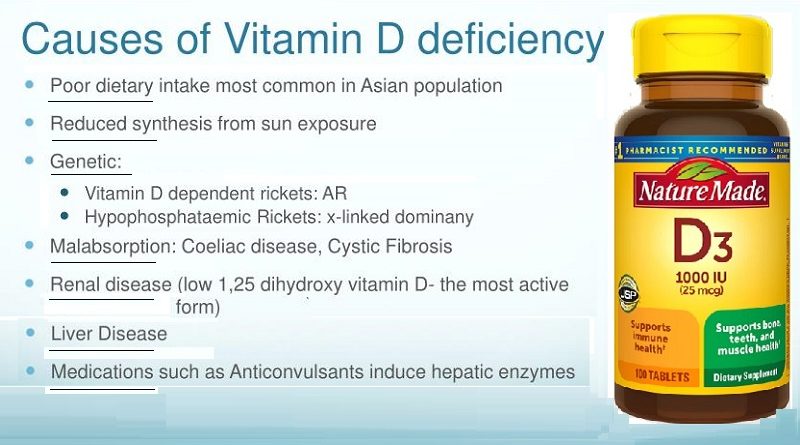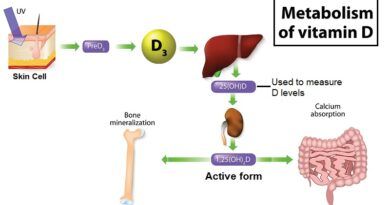Top 5 Causes of Vitamin D Deficiency
It’s important to learn about the causes of Vitamin D Deficiency, so you can be sure you are getting enough from this vitamin. If you been feeling tired, achy, or irritable lately? these symptoms may be the effect of vitamin D deficiency. In this article, we will explore the top 5 causes of vitamin D deficiency, including less consumption, lack of production, or utilization.
Top 5 Causes of Vitamin D Deficiency
- Lack of Sun Exposure:
One of the primary ways our bodies produce vitamin D is through exposure to sunlight. If your area has little sunlight or you spend most of your time indoors, your vitamin D may become deficient. - Poor Diet:
Lack of dietary intake is an important cause of the deficiency. You have to consume enough vitamin D-rich foods, such as fatty fish, eggs, or fortified milk, to be sure you are getting enough of this essential vitamin. - Medical Conditions (Malabsorption):
Certain medical conditions, such as celiac disease, Crohn’s disease, or kidney disorders, can also contribute to vitamin D deficiency. If we will discuss medical causes later in more detail. - Aging (less production):
When we get older our bodies become less efficient at producing vitamin D. This can put older adults at greater risk for deficiency and related health problems. - Medications (decreased absorption):
Certain medications, such as anticonvulsants or glucocorticoids, can interfere with the body’s ability to absorb vitamin D.
Medical conditions causing vitamin D deficiency
Medical conditions can contribute to vitamin D deficiency in a number of ways. Certain conditions can affect the body’s ability to absorb or convert vitamin D, leading to lower levels in the blood. Others may interfere with the metabolism or storage of vitamin D, causing it to be excreted from the body more quickly. Here are some medical conditions that can increase the risk of vitamin D deficiency:
- Celiac Disease:
Celiac disease is an autoimmune disorder that affects the small intestine. People with celiac disease may have difficulty absorbing nutrients from food, including vitamin D. - Inflammatory Bowel Diseases:
Inflammatory bowel diseases (IBD), such as Crohn’s disease or ulcerative colitis, can also interfere with nutrient absorption in the digestive tract, including vitamin D. - Kidney Disease:
The kidneys play an important role in converting vitamin D into its active form, which is needed for proper calcium absorption and bone health. If the kidneys are not functioning properly, this process may be disrupted, leading to vitamin D deficiency. - Liver Disease:
The liver is responsible for converting vitamin D into its active form as well. If the liver is damaged or not functioning properly, this process may be impaired, leading to lower levels of active vitamin D in the blood. - Obesity:
Vitamin D is a fat-soluble vitamin, which means it is stored in fat cells in the body. Obese individuals may have lower levels of vitamin D in the blood due to a higher volume of fat cells that can trap vitamin D and make it less available for use. - Cancer:
Certain cancers, such as breast, colon, and prostate cancer, have been associated with lower levels of vitamin D. Researchers believe this may be due to the body’s increased demand for vitamin D during periods of rapid cell growth.
| Medical Condition | Description |
|---|---|
| Celiac Disease | An autoimmune disorder that affects the small intestine, making it difficult to absorb nutrients |
| Inflammatory Bowel Disease | Can cause inflammation in the digestive tract, leading to nutrient malabsorption |
| Kidney Disease | Impaired kidney function can interfere with the conversion of vitamin D into its active form |
| Liver Disease | Also, like kidney disease, can interfere with the conversion of vitamin D into its active form |
| Obesity | Vitamin D is stored in fat cells, and obese individuals may have lower levels in the blood |
| Cancer | Some cancers are associated with lower levels of vitamin D due to increased demand |
How some medications can cause deficiency
Some medications can interfere with the absorption of vitamin D, making it more difficult for the body to use this essential nutrient. Here are some ways that medications can decrease vitamin D absorption:
- Blocking Absorption: Certain medications, such as antacids, can interfere with the absorption of vitamin D in the digestive tract. These medications can reduce the acidity of the stomach, which is needed to absorb vitamin D properly.
- Increasing Excretion: Some medications, such as diuretics, can increase the excretion of calcium from the body. Since vitamin D is needed for proper calcium absorption, this can lead to lower levels of vitamin D in the blood.
- Interfering with Metabolism: Certain medications, such as glucocorticoids, can interfere with the body’s ability to convert vitamin D into its active form. This can lead to lower levels of active vitamin D in the blood, which can contribute to bone loss and other health problems.
- Competing for Receptors: Some medications, such as cholesterol-lowering drugs, can compete with vitamin D for receptors in the body. This can make it more difficult for the body to use vitamin D effectively, leading to lower levels in the blood.
SUMMARY
Vitamin D deficiency is a common issue that can cause a range of unpleasant symptoms. By understanding the top causes of deficiency, you can take steps to ensure you’re getting enough vitamin D through diet, sunlight, and other sources. Talk to your doctor if you have concerns about your vitamin D levels or want to explore ways to optimize your health and wellness.




